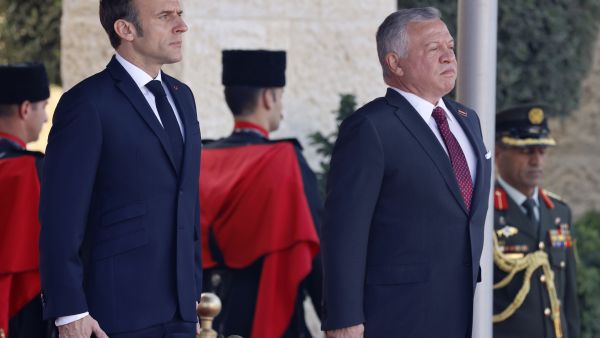The role and presence of France in the Middle East dates back to before the Crusades. In the past centuries, apart from the close relationship between Christians in the region and France, the presence of Christian missionaries, the geopolitical, military-political, and commercial importance of the Middle East for Paris led to an increase in interest and then the colonial presence of France in the region. In the 20th century, France by fighting the Ottoman Empire and dividing some Ottoman provinces (Sykes-Picot Agreement ) with London, tried to protect its interests, and gradually help the countries in the region to be independent.
In the past two decades, we have witnessed various and numerous trips of high French officials such as the president, prime minister, and various ministers such as the minister of foreign affairs, foreign trade, defense, etc. to the Middle East. After the re-election of Emmanuel Macron as the President of France in April 2022, the country pursued the goal of strengthening its role in the Middle East.
Le président algérien Abdelmajid Tebboune a salué la nouvelle "relation de confiance" entre la France et l'Algérie et son "amitié réciproque" personnelle avec Emmanuel Macron, nouveau signe du réchauffement de relations bilatérales souvent tumultueuses pic.twitter.com/0uG0ErrodG
— Middle East Eye Fr (@MiddleEastEyeFr) December 30, 2022
Geopolitical and political approach and goals
In 2020, French leaders and officials have pursued wide-ranging relations in various dimensions with various actors in the Middle East. The increase in Macron's meetings in 2022 with most of the Middle East leaders, traveling to several countries, hosting them in Paris, and meeting in various international forums such as the climate change meeting in Egypt's Sharm el-Sheikh, the 'Baghdad II' summit in Jordan, etc. was prominent.
It was also Macron's first trip to the Middle East after his re-election. Welcoming a large number of Arab leaders and officials such as Bahrain, UAE, Qatar, Egypt, Saudi Arabia, and Palestine in 2022 is seen as a kind of step by Paris to revive France's diplomatic role in the Middle East. New changes in the geopolitics of Europe and the world, the crisis in Ukraine, the further withdrawal of America from the Middle East, the recent developments, and the movement towards multipolarity in the international system, have led the countries of the Middle East to diplomatic relations and the expansion of geopolitical partners.
This is an opportunity for Paris to strengthen its presence in the Middle East. France sees itself as a power with global responsibility. In fact, following the reducing of America's military presence in the Middle East, and aimed to increase the role and position of France in the world power pyramid, Paris is struggling to return to the region.
Opinion | L’"islam de France" de Macron fait écho aux politiques répressives des régimes du Golfe https://t.co/H7UAaoTXRZ pic.twitter.com/DYMmTNJk8W
— Middle East Eye Fr (@MiddleEastEyeFr) December 30, 2022
The effect of preserving strategic independence and the legacy of Gaullism in French foreign policy has also strengthened the idea of strengthening Europe's strategic independence and trying to strengthen its role in the Middle East. In another dimension, global and regional competition in the region has become more prominent. The geostrategic importance of the Middle East has provided the ground for the occurrence of multilateralism in this region.
At the same time, France is trying to prevent the reduction of its role in the region by increasing relations with different countries in the region, mediating in disputes and conflicts, and actively using multilateral formats. In the meantime, the risk of the Middle East being more in the sphere of China-Russia influence is an important motivation for France to be more present in the Middle East. In fact, Paris is trying to be the most important alternative to Washington or the second-world power in the Middle East after America's attention to the region has decreased.
It also seems that France considers it important to create ‘regional balance’ in the Middle East. That means, by protecting the interests and establishing a balance against the influence of Iran and Turkey, Paris seeks to reduce the position of Iran and counter the greater influence of Turkey in the Middle East. Paris, as one of the biggest critics of Turkey, does not want US's withdrawal from the region to create extensive opportunities for Turkey to the detriment of the Western allies in the Middle East such as Israel and Arab countries.
In this regard, Paris and Ankara have still many differences over various issues like distinguishing different Kurdish groups, Turkey's attacks against the Kurds in northern Syria, Turkey's role in the migrant crisis, Paris's strategic partnerships with Athens, Cyprus, the Emirates, and Egypt, Turkey's role in the Mediterranean, etc.
Big If! Iran deadlocks Lebanon.
Macron is "convinced" that problems in the Middle East can only be resolved "if we find a framework for discussion that includes Iran, given its influence in the region". https://t.co/i8UNTBGwnL
— wissamtarif (@wissamtarif) December 28, 2022
However, it seems that France will continue to defend relations with Iran in order to revive the JCPOA based on the Vienna negotiations, mediate between Tehran and other actors in the region, and reduce the scope of crises in the region. In this regard, support for Baghdad summit and the strengthening of Iraq's role are in France's Middle East policy agenda. In fact, Paris is simultaneously trying to advance the project of reducing Iran's role in the development of the region and somehow involve Iran in solving regional problems, especially in Syria and Lebanon.
Also, France may consider a kind of balance, especially with regard to the relations between the Arab countries of the region and Iran, so it gives conflicting signals toward Iran's nuclear program, but certainly, France's challenge with Iran in Syria, Yemen and other areas of the Middle East is greater than Paris's challenge with the Arab actors. In this regard, in the past year, the meetings of the leaders of the UAE and Saudi Arabia with Macron, as an alternative to Washington, and a valid option to diversify relationships have been accelerated. In fact, the past strategic closeness between Paris and Abu Dhabi and similar concerns such as Iran's role have strengthened relations.
Also, France's relations with Saudi Arabia have been accelerated after Macron's visit to Jeddah in December 2021, and the main area of cooperation with Riyadh has also increased. In another dimension, France's direct connection with the Mediterranean has caused Paris to pay more attention to the Eastern Mediterranean. In this area, Paris has paid attention to the common interests of France and Israel, which led to the improvement of bilateral relations.
France was happy to see these "revolutionary" scenes inside Iran,
Then naturally we are happy to see the ongoing revolution of the french people against the tyranical french government and Mullah Macron https://t.co/J6weer5SWi
— Middle East Observer 2 (@ME_Observer_2) December 25, 2022
In the meantime, France still welcomes Abraham Accords, but it seems that mediation in peace talks and support for a two-state solution can be under the consideration by Paris. In addition, Macron's recent visit to Egypt emphasizes the growing relationship between Cairo and Paris based on a set of interests, parallel foreign goals, and geopolitical and security affinities. This is while France pays great attention to Lebanon and helps to solve its problems.
In fact, France is trying to strengthen the main position of Paris in Lebanon as a francophone country, with tens of thousands of Lebanese with French citizenship, by defending the stability, unity, independence, and sovereignty of Lebanon. In this regard, France intends to contact Iran to resolve the issues in Lebanon, and to reduce the diplomatic crisis in Lebanon and the countries of the Gulf Cooperation Council. However, the expansion of France's friendly relations with the Kurds is still important for Paris.
security and defense-military approach
Anti-terrorism cooperation is one of the most important opportunities for bilateral cooperation between Middle Eastern countries and France. France has the largest Muslim community in Europe, and the future of the connection of French citizens to terrorist groups in the Middle East is a serious concern of French leaders.
Paris is also the second coalition partner against ISIS in the NATO NM-I mission, emphasizing France's commitment to fighting ISIS in the Middle East. Also, as a permanent member of the UN Security Council and other international organizations, Paris is trying to obtain the international, political, diplomatic, and military support needed by its allies in the Middle East. The challenges of immigration and terrorism are still important. Paris does not want security instability in the Middle East and endless waves of religious and ethnic violence to lead to the displacement and migration of millions of people and a direct threat to European security.
Therefore, France does not want Syria to lead to a large-scale conflict between Turkey, Iran, Russia, or Israel and Iran. France also is willing to preserve its interest by returning to the JCPOA negotiations and reaching an agreement and by Iran's good approch. In addition, a joint fight with the Middle East countries on terrorism, illegal immigration, consultation, and the trial of French extremists is still considered by Paris. Energy security has become more important for France due to Europe's desire to reduce dependence on Russia.
On the other hand, France is currently one of the top military exporting countries to the world and the Middle East. Paris is trying to expand its export role in the Middle East, especially to the countries such as the UAE, with large arms contracts, localization of heavy military industries, and modern technology. and strengthen Saudi Arabia and Egypt.
Economic and cultural approach
France is among the top seven economies in the world and adjusts the main part of its foreign policy based on economic priorities, including in the Middle East. Also, economic departments and France’s diplomatic representation in the Middle East have been strengthened. It seems that in the economic diplomacy of Paris in the Middle East, the attraction of foreign investment, the strengthening of energy transfer projects in the Mediterranean Sea, the balanced price of energy, the preservation and diversification of energy, and the expansion of French companies in the region have been more strategically important.
In addition, the French community in the Middle East is limited and very small. But the Middle Eastern diaspora is widespread in France. Also, awarding scholarships, encouraging the position of the French language, strengthening soft power, and French support for Middle Eastern Christians and small minorities are part of France's approach in the Middle East. In another dimension, France is taking steps to strengthen its position and soft power in the Middle East by pursuing its Human Rights and Development strategy, having the largest cultural network in the world, and promoting francophone and multilingualism.
Vision
There are many geopolitical, political, economic and security challenges for France to act as a superior and great power and to replace America in the Middle East. Also, France has a lower position in the Middle East in the competition with regional actors. However, it seems that France's economic strength and energy security are still very important variables in attracting France's future attention to the Middle East.









